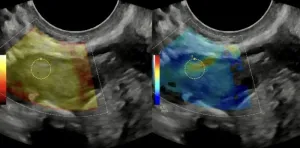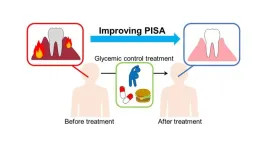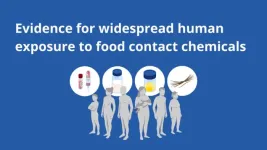(Press-News.org) New evidence shows that extended estrogen suppression treatment using an aromatase inhibitors for hormone receptor-positive postmenopausal breast cancer is safe; it does not increase the risk of coronary artery calcification, a sign of active coronary atherosclerosis, as some prior studies had indicated. An article in the Canadian Journal of Cardiology, published by Elsevier, details the findings from a retrospective, cross-sectional observational study that investigated the association between the duration of aromatase inhibitor treatment and the severity of coronary artery calcification in postoperative breast cancer patients.
Coronary artery calcification is a significant predictor of adverse outcomes in the general population, which is believed to be associated with atherosclerosis, the condition that causes angina and heart attacks. Despite estrogen's beneficial role in cardiovascular health, its suppression is often necessary in patients with breast cancer. Hormonal therapy, particularly the use of aromatase inhibitors (which block the production of estrogen), is a standard treatment after breast cancer surgery for postmenopausal women. While these therapies are effective in reducing cancer recurrence, there is increasing concern about their potential cardiovascular side effects, including acceleration of coronary artery atherosclerosis.
Lead investigator Yu Hiasa, MD, Department of Cardiology, Pulmonology, Hypertension & Nephrology, Ehime University Graduate School of Medicine, Toon, Japan, explains, “Although there is an ongoing discussion on the optimal duration of aromatase inhibitor therapy (5 years or 10 years), our data suggest that longer aromatase inhibitor use (as often used to prevent or suppress late recurrences or spread of breast cancer) is safe, at least in regard to coronary artery calcification.”
The investigators conducted a single-center, retrospective, cross-sectional observational study among 357 postmenopausal breast cancer patients who initiated adjuvant endocrine therapy with aromatase inhibitors for breast cancer between August 2010 and October 2022 as outpatients. Coronary artery calcification was quantified using a visual ordinal scoring system, and patient characteristics were assessed based on the presence of coronary artery calcification. Independent risk factors for elevated coronary artery calcification scores were identified through a multivariable logistic regression model.
Co-investigator Akinori Higaki, MD, PhD, Department of Cardiology, Pulmonology, Hypertension & Nephrology, Ehime University Graduate School of Medicine, Toon, Japan, adds, "Our analysis of the postoperative breast cancer patient cohort revealed that the duration of treatment with aromatase inhibitors and the presence of osteoporosis were not associated with coronary artery calcification."
In patients diagnosed with coronary artery calcification prior to the study, its severity was not impacted by the treatment.
In addition to the well-known risk factors for coronary artery calcification such as older age, hypertension, and diabetes mellitus, researchers found that a lower hemoglobin level is also an independent risk factor for coronary artery calcification.
In an accompanying editorial, Ibrahim Alfaris, MBBS, Division of Cardiovascular Medicine, Stanford University School of Medicine, Stanford, CA, notes, "Identifying low hemoglobin as a novel, highly significant risk factor for coronary artery calcification in this population raises the possibility of adding anemia as an indication for cardiovascular screening. Anemia is not typically noted in classic atherosclerotic cardiovascular disease risk calculators or expert recommendations, and this finding could lead to changes in screening practices for postmenopausal women undergoing aromatase inhibitors therapy."
Dr. Alfaris concludes, "Understanding the association between the duration of aromatase inhibitors treatment and the severity of coronary artery calcification in postoperative breast cancer patients is crucial, as it impacts the long-term health management of breast cancer survivors, who are at significant risk for cardiovascular disease due to the anti-estrogenic effects of their therapy."
END
Evidence shows that estrogen blocker treatment does not increase the risk of coronary heart disease in breast cancer patients
New study in the Canadian Journal of Cardiology offers new evidence about the safety of aromatase inhibitors and important insights for the long-term health management of breast cancer survivors
2024-09-17
ELSE PRESS RELEASES FROM THIS DATE:
Survey shows 25% of adults consider weight loss drug use without prescription
2024-09-17
COLUMBUS, Ohio – Injectable weight loss drugs are popular right now but can be hard to get because they are in short supply or too expensive without insurance. The result is that some people are skipping the doctor’s office and reaching out to potentially unreliable sources such as unlicensed online pharmacies or telehealth sites, which could expose patients to risks.
A new national survey from The Ohio State University Wexner Medical Center reveals 1 in 4 (25%) of 1,006 adults surveyed would consider using an injectable weight loss medication without consulting their doctor. The reasons ...
New treatment extends ovarian function in older mice
2024-09-17
Medication to reduce ovarian scarring helps extends overall health of reproductive system
Freezing eggs only addresses age-related infertility, not ovarian hormone loss. New treatment would ‘fix the root of the issue’
Findings also have implications for developing treatments for ovarian cancer
CHICAGO --- A woman’s ovaries are like a factory where eggs grow and produce hormones that regulate everything from menstruation and pregnancy to bone density and mood. As she and her factory age, production dwindles, and by the time she hits menopause ...
Getting to the root of the problem: Intensive diabetes treatment reduces gum disease inflammation
2024-09-17
Osaka, Japan – While the link between diabetes and periodontal disease is known, the impact of diabetes treatment on periodontal health is less well understood. Recent research published in Diabetes, Obesity and Metabolism demonstrates that periodontal inflammation can be positively affected just by receiving intensive diabetes treatment.
It is widely believed that there is an interrelationship between diabetes and periodontal disease. While it has been shown that treatment of periodontal disease improves blood ...
Researchers take power and efficiency of biological sensing to record level
2024-09-17
University of Arizona researchers have developed a new biological sensing method that can detect substances at the zeptomolar level – an astonishingly miniscule amount.
This level of sensing, immediately useful for drug testing and other research, has the potential to make new drug discoveries possible. Eventually, the advance could lead to portable sensors that can detect environmental toxins or chemical weapons, monitor food quality or screen for cancer.
A paper describing the results was published in the journal Nature Communications on Aug. 28.
Judith Su, associate professor of biomedical engineering and optical ...
Under-plant mirrors improve endangered plant survival and growth
2024-09-17
The most endangered plant species in the Mariana Islands, the legume tree Serianthes nelsonii, faces persistent threats in its recovery. These have been identified as a short lifespan of habitat seedlings and rapid death of saplings transplanted from conservation nurseries.
The Plant Physiology Laboratory at the University of Guam addressed this conundrum by improving growth and survival of Serianthes seedlings through strategically placed mirrors beneath deeply shaded seedlings to increase available ambient light. The resulting paper has been published ...
Widespread evidence for packaging-related chemicals in humans
2024-09-17
About this study: A new review is the first to reveal the extent of human exposure to food contact chemicals (FCC), with 3,601 chemicals used in food packaging and other food contact articles having been found in human bodies. The authors say this review also highlights significant gaps in biomonitoring and toxicity data.
---
In a new study, published in the Journal of Exposure Science and Environmental Epidemiology, scientists describe the widespread human exposure to food contact chemicals (FCCs). The research reveals which chemicals ...
Hardship early in life can affect health and longevity – even for marmots
2024-09-16
Key takeaways
The cumulative adversity index for people quantifies numerous measures of hardship, such as poverty and stress to understand health and longevity over the individual’s lifespan.
A similar tool could help scientists who study and want to conserve animal populations by identifying the most influential stressors to mitigate.
UCLA biologists have created the first cumulative adversity index for yellow-bellied marmots. They found that as in humans, adversity early on had lifelong consequences and reduced their life expectancy.
Adversity early in life can have permanent health consequences for people — even if their circumstances improve dramatically later on. ...
Chances of successful pregnancy are the same with embryo transfer on day three or five
2024-09-16
In IVF treatment, embryos are traditionally transferred in the uterus three days after fertilization. Due to improvements in laboratory techniques, this is now also possible after five days. It was assumed that this increases the chance of a successful pregnancy. A study by Radboud university medical center and Amsterdam UMC shows that the day of transfer does not influence the success rate of the IVF trajectory.
One out of thirty children in the Netherlands is conceived via in vitro fertilization, or IVF for short. In this procedure, ...
The Lancet: More than 39 million deaths from antibiotic-resistant infections estimated between now and 2050, suggests first global analysis
2024-09-16
Embargoed access to the paper and contact details for authors are available in Notes to Editors at the end of the release.
The Lancet: More than 39 million deaths from antibiotic-resistant infections estimated between now and 2050, suggests first global analysis
First in-depth analysis of global health impacts of antimicrobial resistance (AMR) over time reveals trends from 1990 to 2021 and estimates potential impacts to 2050 for 204 countries and territories.
More than one million people died from AMR globally each year between 1990 and 2021. Over the period, AMR deaths among children aged under five declined by 50% while those among people aged 70 ...
Fraunhofer IAF low-noise amplifiers aboard the Arctic Weather Satellite
2024-09-16
The Arctic Weather Satellite (AWS) of the European Space Agency (ESA) was sent on its journey to a polar orbit 600 km above the Earth on August 16, 2024. On board: four low-noise amplifiers (LNAs) from the Fraunhofer Institute for Applied Solid State Physics IAF in Freiburg. They are essential components of the passive microwave radiometer with which the AWS measures temperature and humidity in the Arctic more precisely than ever before. This should contribute to a better understanding of both the Arctic and the climate change that is particularly visible in it. If the mission is successful, ...
LAST 30 PRESS RELEASES:
Study finds early imaging after pediatric UTIs may do more harm than good
UC San Diego Health joins national research for maternal-fetal care
New biomarker predicts chemotherapy response in triple-negative breast cancer
Treatment algorithms featured in Brain Trauma Foundation’s update of guidelines for care of patients with penetrating traumatic brain injury
Over 40% of musicians experience tinnitus; hearing loss and hyperacusis also significantly elevated
Artificial intelligence predicts colorectal cancer risk in ulcerative colitis patients
Mayo Clinic installs first magnetic nanoparticle hyperthermia system for cancer research in the US
Calibr-Skaggs and Kainomyx launch collaboration to pioneer novel malaria treatments
JAX-NYSCF Collaborative and GSK announce collaboration to advance translational models for neurodegenerative disease research
Classifying pediatric brain tumors by liquid biopsy using artificial intelligence
Insilico Medicine initiates AI driven collaboration with leading global cancer center to identify novel targets for gastroesophageal cancers
Immunotherapy plus chemotherapy before surgery shows promise for pancreatic cancer
A “smart fluid” you can reconfigure with temperature
New research suggests myopia is driven by how we use our eyes indoors
Scientists develop first-of-its-kind antibody to block Epstein Barr virus
With the right prompts, AI chatbots analyze big data accurately
Leisure-time physical activity and cancer mortality among cancer survivors
Chronic kidney disease severity and risk of cognitive impairment
Research highlights from the first Multidisciplinary Radiopharmaceutical Therapy Symposium
New guidelines from NCCN detail fundamental differences in cancer in children compared to adults
Four NYU faculty win Sloan Foundation research fellowships
Personal perception of body movement changes when using robotic prosthetics
Study shows brain responses to wildlife images can forecast online engagement — and could help conservation messaging
Extreme heat and drought at flowering could put future wheat harvests at risk
Harlequin ichthyosis: a comprehensive review of pathogenesis, diagnosis, and management
Smithsonian planetary scientists discover recent tectonic activity on the Moon
Government censorship of Chinese chatbots
Incorporating a robotic leg into one’s body image
Brain imaging reveals how wildlife photos open donor wallets
Wiley to expand Advanced Portfolio
[Press-News.org] Evidence shows that estrogen blocker treatment does not increase the risk of coronary heart disease in breast cancer patientsNew study in the Canadian Journal of Cardiology offers new evidence about the safety of aromatase inhibitors and important insights for the long-term health management of breast cancer survivors





